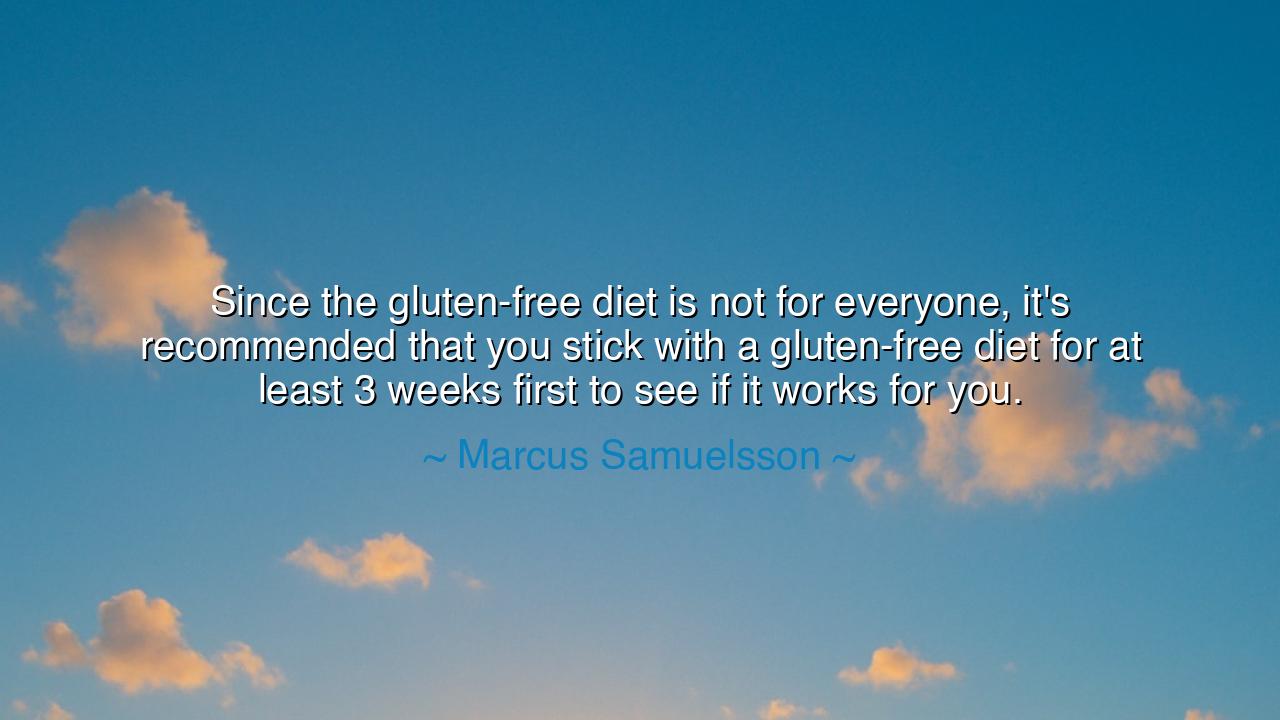
Since the gluten-free diet is not for everyone, it's recommended
Since the gluten-free diet is not for everyone, it's recommended that you stick with a gluten-free diet for at least 3 weeks first to see if it works for you.






"Since the gluten-free diet is not for everyone, it's recommended that you stick with a gluten-free diet for at least 3 weeks first to see if it works for you." – Marcus Samuelsson
In this wise and measured counsel, Marcus Samuelsson speaks with the calm voice of discernment, echoing a truth known since the dawn of human understanding: that wisdom lies not in blind imitation, but in self-knowledge. His words are not the commands of a zealot but the guidance of a sage. He reminds us that no path, no diet, no philosophy fits all souls alike. For just as no two leaves are shaped the same, no two bodies carry the same rhythm or hunger. His teaching is a call to listen—to observe—to allow time, three weeks of patience, for the truth to reveal itself from within rather than from without.
In the ancient world, those who sought balance in body and spirit did not look to rigid doctrine, but to experience. The physicians of Greece and Egypt, the healers of India and China, all shared this same belief: that healing begins with observation, and that the body itself is the greatest teacher. Samuelsson’s advice continues this lineage of wisdom. He speaks to a world quick to grasp at trends and absolutes, urging instead a return to the ancient art of experimentation—a sacred trial of three weeks, a period long enough for the body to whisper its truths, but brief enough to guard against folly.
Consider the example of Hippocrates, the father of medicine, who once treated a man suffering from endless fatigue and swelling. Rather than prescribing herbs or charms, Hippocrates asked him to eat differently—to remove certain grains from his meals. “Watch yourself,” he said. “Observe how you feel in the coming moons.” Weeks later, the man returned renewed in strength, his ailments vanished. The cure was not the absence of food, but the presence of awareness. So too does Marcus Samuelsson remind us that the goal of the gluten-free diet is not conformity, but discovery—to see, by trial and by time, whether the body thrives or resists.
The origin of this wisdom lies in the eternal tension between simplicity and excess. Modern life, with its abundance of options, often clouds our instincts. We follow systems and slogans instead of sensations. Samuelsson’s counsel returns us to what the ancients called gnōthi seauton—“Know thyself.” By giving the diet time—by living it, tasting it, breathing it for three weeks—one learns through direct experience whether it is a path of healing or merely a detour. It is a lesson not just of diet, but of life itself: that truth reveals itself only through patience and observation.
There is also humility in his words. To say that the gluten-free diet is not for everyone is to acknowledge the diversity of human nature—the uniqueness of every body, every spirit. Such humility is rare in an age of certainty. Samuelsson’s wisdom stands apart because it celebrates individuality. He does not demand devotion to a doctrine, but invites reflection. He reminds us that health, like art or music, is deeply personal—a harmony one must discover within. What nourishes one may burden another; what heals one may hinder another. Thus, the true seeker must walk the path themselves, step by step, meal by meal.
The three-week test becomes, then, a symbol of transformation. It is a pilgrimage in miniature—a span of time in which the traveler learns not only what food sustains them, but what habits define them. The first week brings discomfort, the second reveals adaptation, and the third—clarity. In that clarity, one finds not only answers of the body but lessons of the soul: patience, awareness, gratitude. Samuelsson’s counsel is not about restriction, but about awakening—a chance to rekindle the lost conversation between the self and its vessel.
The lesson, therefore, is simple yet profound: listen to your body. Approach change with curiosity, not fear. Do not rush to follow every voice that shouts its truth from the marketplace of wellness; instead, take time to discover what your own voice says. Let experience, not fashion, be your guide. Test, observe, and trust what you find. Whether you remain on the path of the gluten-free or return to the broader table, you will have gained something far greater than a meal plan—you will have gained understanding.
So let this wisdom endure: the body is not a battleground of rules, but a compass of truth. As Marcus Samuelsson teaches, every journey toward health must begin with patience, for time reveals what haste conceals. Try, listen, learn, and in the quiet of your own experience, you will find the diet that is not another’s law, but your own balance—the harmony of nourishment, awareness, and self-respect.






AAdministratorAdministrator
Welcome, honored guests. Please leave a comment, we will respond soon